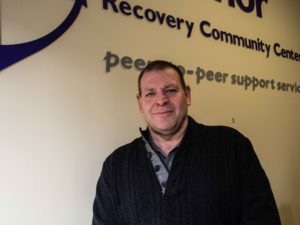
George O’Toole – Anchor Recovery Community Center
In this interview, George O’Toole, Manager of the Anchor ED program at Anchor Recovery Community Center – Pawtucket, discusses the importance of peer support systems in recovery.
Tell me a little about the Anchor Recovery Community Center. What do you focus on? What services do you offer?
Peer recovery support is the chief service that Anchor offers. Our Recovery Coaches (RC) have the lived experience of addiction and recovery and can help others navigating the challenges of recovery for the first time. Each Recovery Coach builds what we call a “tool box,” which consists of resources that include detoxification centers, outpatient resources, medical assisted recovery (MAR), and various support groups that a person beginning or maintaining recovery might be interested in.
We also have employment specialists, who help create resumes and teach interview techniques. These services can be especially useful for those with substance use disorder who have served time.
Can you explain how Anchor defines recovery?
At Anchor, we like to say that a person is in recovery when they say they are in recovery. If a person says they are committed to recovery right now that is good enough for us, and we will do everything we can to help them stay on their path of recovery.
Tell me a little about what you do here at Anchor. What do you work on?
In 2014 when the overdose epidemic hit Rhode Island the Acting Director of BHDDH, Rebecca Boss, and Jim Gillen came up with an innovative idea. Why not meet people with substance use disorder where they are? They developed a proposal to initiate recovery coach contact in emergency departments and our AnchorED program was born. We started in only 4 EDs and now we are in all 12 EDs statewide. This is a big part of the work that I do currently.
What are some of the most significant challenges that people recovering from substance use and mental health challenges face?
Some of the biggest challenges these people face is finding employment and housing. Many of our clients have criminal pasts, and companies and landlords will not take them on. It is discouraging to invest so much of your time into the process of recovery and to continue to be denied opportunities to change your life. That is why places like Anchor are so important. We have resources to help people in recovery overcome those barriers. Our employment specialists do great work.
What partnerships are essential to work?
The city of Pawtucket in particular has been great. Mayor Donald Grebien and Pawtucket Police Captain Michael Newman have been champions of Anchor for a long time. They have collaborated with us to advocate for recovery support services in Pawtucket and throughout Rhode Island.
The Providence Center has also been supportive of us and our process. While they guide us and support us, they allow us enough autonomy to do our jobs the way we need to as a peer recovery organization.
How does Anchor work to address the opioid epidemic? What is happening with other RI partners? What are the biggest challenges? What are the most recent major successes?
Anchor does a lot of outreach and awareness work. We promote recovery and talk about substance use disorder on various commercials and on our public television program, Recovery Talks. Our biggest outreach and awareness event is the Rally for Recovery in September.
One big challenge in addressing the opioid epidemic is that people like to believe it does not happen in their communities. But substance use happens everywhere. No city or town or school escapes it.
A major success of Anchor’s is the Anchor ED program. Other states are starting to look at Rhode Island as a model for initiating peer recovery in the emergency department.
What recommendations would you have for community prevention providers working to prevent substance use in their communities?
It is so important to reach young people – those who already have experiences with substance use disorder themselves or within their families or circle of friends and those who have no experience at all. We need to do a better job reaching the next generation in prevention and treatment capacities.

